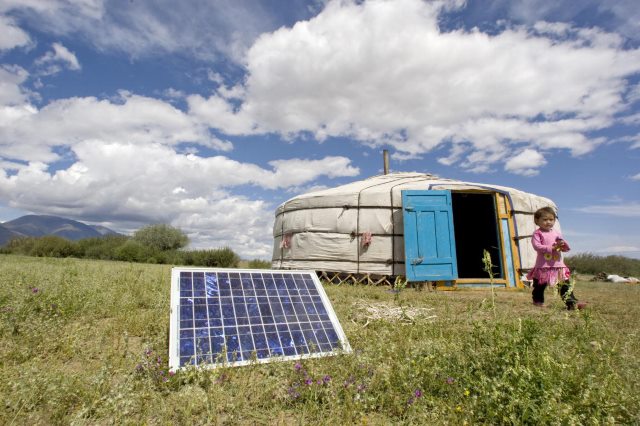Mary Robinson delivers the keynote speech at the International Energy Agency’s inaugural big IdEAs Seminar in Paris on 3 November 2015.
In the first installment of the International Energy Agency’s (IEA) new high-level speaker series aimed at fostering learning and inspiration, Mary Robinson, President, Mary Robinson Foundation – Climate Justice, discussed the role of sustainable energy in ending poverty and advancing climate justice.
With just under a month to go to the climate negotiations in Paris and two months to go until the commencement of the 2030 Agenda for Sustainable Development, Mary Robinson told energy experts and IEA country ambassadors in Paris, and many more viewing online, that the provision of sustainable energy to the poorest people on earth will be central to advancing both of these major international processes.
“Climate change requires us to fundamentally rethink how we power our societies. Our tried and tested development paradigm is totally unsustainable.” Mrs Robinson told the audience in Paris. She called on the audience to consider the potential of delivering off-grid energy solutions through social protection systems. The beneficiaries of social protection programmes include chronically poor and economically vulnerable people, she argued, while also constituting a significant proportion of those who have no access to energy.
Today, there are still 1.3 billion people without access to electricity and 2.7 billion people relying on the traditional use of biomass for cooking, giving rise to harmful indoor pollution. The new development agenda recognises access to energy is a critical component of ending poverty and enabling people to live full and productive lives – however the emissions generated from fossil fuel based energy generation accelerate climate change. Enabling universal access to modern energy supplies, the aim of the Sustainable Development Goal (SDG) on energy, while simultaneously tackling climate change, will require new and innovative approaches to the delivery of clean, sustainable energy services to those living in energy poverty.
“For the poorest people and communities, access to sustainable energy should be viewed as an enabler of positive development outcomes. As such, it could be considered a public good, in much the same way as education, healthcare or public infrastructure.” Mrs Robinson said.
In 2012 the Foundation convened the sustainable energy and social protection teams of the World Bank to explore opportunities of innovative delivery mechanisms. The same year, Mrs Robinson visited Malawi and discussed the potential of such mechanisms with government officials and bilateral donors. Today, Malawi is piloting a project to deliver clean cook stoves utilizing the country’s social cash transfer system, with a plan to scale up the programme to 320,000 households by the end of 2016.
The IEA is an autonomous organisation which works to ensure reliable, affordable and clean energy for its 29 member countries and beyond. The IEA has four main areas of focus: energy security, economic development, environmental awareness and engagement worldwide.
Related Links
Mary Robinson Keynote Speech_International Energy Agency_Big IdEAs_3 Nov 2015
The International Energy Agency
Zero Carbon, Zero Poverty the Climate Justice Way
Meeting the Energy Needs of the Poorest: A Role for Social Protection (Briefing Paper)
Sustainable Energy for All: Ensuring access for the poorest
Find out more about the Global Alliance for Clean Cookstoves


 A family in Tarialan, Uvs Province, Mongolia, uses a solar panel to generate power for their ger, a traditional Mongolian tent. Tarialan, Mongolia, July 2009. (Photo: UN/ Eskinder Debebe
A family in Tarialan, Uvs Province, Mongolia, uses a solar panel to generate power for their ger, a traditional Mongolian tent. Tarialan, Mongolia, July 2009. (Photo: UN/ Eskinder Debebe